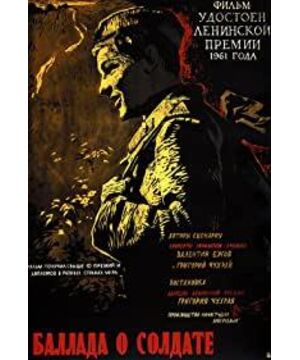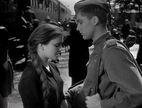But it would be superficial to say that the war is nothing more than that and it ends here. Du Fu said that the beacon fire lasted for three months, and the family letter was worth 10,000 gold. If the skin of war is a cruel beacon, the core of war is actually the warmth of the common people who yearn for peace to communicate with each other when they are displaced or stubbornly resisting, such as a letter to the family whose return date is unknown or a thought of caring for each other. From the Russian-Soviet classic "The Dawns Here Are Quiet" to the Hollywood masterpiece "Cold Mountain", under the background of the dreadful and dreadful artillery fire, the brush strokes extend to the warm touch of human nature's mutual dependence and comfort, and the eroded but not destroyed by the beacon fire. The inextinguishable love for children, homesickness, and even juvenile dreams are low-dimensional and subtle compared to the macro war scenes, but it is the surging warmth in these small layers that is more powerful than the war scenes everywhere. ground, causing turbulence and aftertaste in the audience's heart.
"Song of the Soldiers" is such a work. It only sets up a war scene at the beginning to lead the soldiers to return home, and the next chapter is all about the tenderness between people, and then in the macro background of war The movie viewing experience brought to the audience is full of warmth and melancholy, a black and white story movie. Just as in times of peace we have to take precautions against danger in times of peace, in times of war, in addition to the idea of cruelty, there are more starting points, such as moving, tenderness, and warmth. As mentioned earlier, war has a cruel watch and a warm core. It is like a walnut, and its hard shell contains soft twists and turns. And "Song of the Soldiers" is just such a section of a walnut, showing us the tenderness of warmth and surging, and the twists and turns of melancholy.
Signal soldier Alyosha accidentally bombed two tanks while performing a mission on the front line. During the six-day "vacation" period, he met along the way the one-legged soldier who retired from the front line and became disabled due to the war, the love muse Shura, the former wife who had remarried but was still cared by the friend who fought on the front line, and the The old father, who was sick in bed in the refugee camp but always cared about his son, also experienced an air raid on the train. When he finally returned to his hometown, the planned two-day stay was reduced to the moment and a half to meet and greet his mother. Son. It is such a story that can be summed up in a few sentences. What kind of chemical reaction will occur if the details and atmosphere are added? ——When the general agreed to Alyosha's award for the meritorious battle, Alyosha only sincerely asked if he could be allowed to go back to help his mother repair the roof; The crowded figure hugged him hard, and he was generous with the attachment of the war and also accepted the defect of his lover; when the wife of the friend who had worked so hard to find has remarried, and the old father of the friend was in a refugee camp, Alyosha resolutely took it back. He gave the soap to his wife and passed it on to the old father, while the sick old father heard that his son was feeling relieved, and told Alyosha over and over again, "Tell him, I am fine, don't worry. His wife is also fine. I've been waiting for him"... These kindnesses naturally revealed from human nature in the context of war, like the soft fine sand to the hard shore, the bright little flowers to the desolate soil, the beautiful moon The color of the hazy sky, in the stark disparity and contrast, adds another kind of temperament to the cruel war years like floods and beasts, and that temperament is called warmth.
And the warmth that touches me the most in the movie is the love that we met by chance and the deep affection that lasts forever. Let's talk about love first. The soldiers and girls who accidentally met during the journey, after the initial misunderstandings were resolved, accompany and take care of each other along the way, and inevitably fall in love slowly, but after a good moment, what awaits them is reluctance to part. This kind of love story, which is commonplace in subsequent film and television works, is expressed through the actors' natural and unpretentious performances, and then presented to the audience through retro black and white images, which has allowed us to be deeply healed and touched by pure simplicity. Especially when Alyosha missed the train to fetch water for Shula, and finally reunited with Shula at the bridge, this scene reminded me of "Return", where Feng Wanyu took the steamed buns and bed and went to the station to meet Lu Yanshi again. , However, Yan Shi was discovered by the Red Guards, so Wan Yu could only watch Zhang Wang affectionately and sadly on the overpass, looking at Yan Shi who was running for his life in the crowd, and shouted "Go quickly". One is the Cultural Revolution and the other is the war. They are all love that flickered like a spark in the age of cholera. Life and death may fall apart at any time, like embers that will fly to ashes but refuse to perish, and will perish in the cracks of the times. Struggling to the death, grief and tenderness. People can't help but sigh, the poor Wuding River Bone is like a person in a deep boudoir's dream. There is also an impressive scene. In the crowded military train, Alyosha and Shura stood at the junction of the carriage and the carriage, looking at each other without any further words. Shula's hair fluttering in the wind, Alyosha's sincere and affectionate eyes, outside the hurrying train, the scenery along the way continues to rustle away, the endless mountains and staggered trees, and the light and shadow on the faces of the two Clearly extinguished, quiet and peaceful. At that moment, the silence of time became eternity, and the troubled times fell into the void, which made people feel sincerely, if the picture was frozen at this moment, how good it would be!
Say affection. As the old saying goes, "the child travels a thousand miles and the mother is worried." In fact, why don't the wandering child or the soldier guarding the front line miss his mother? Thousands of miles away, worry about the temples for another year in the Ming Dynasty." When Alyosha finally returned to his hometown and came to his mother, he could only get together for a short time, almost just a quick glance. He wanted to give her a big hug, greet her warmly, and then turn back decisively to say goodbye in a relaxed manner, but it seemed that Behind the generosity, is it really as chic as we think? When the mother crossed a reed meadow to meet her son, her hurried footsteps were full of urgency and anticipation, she pushed aside the crowd and pulled the hand of Alyosha, who was surrounded by them, shouting, "He is tired, let him rest. Let me cook a meal for him first." But I was told that I can only get along with the child who is thinking about it for a while. The expectations and gaps, hope and disillusionment here, if it is not for the mother who is alone in her homeland How can people experience the grief that is treated calmly on the surface but is actually turbulent. Therefore, she could only reluctantly rub the child's face over and over again, asked Alyosha if you smoked, and said Alyosha, you shaved. In the end, mother stood like a stele on this side of the path, and on the other side of the path, the truck carrying Alyosha was slowly leaving. The crops and reeds on both sides of the road spread to the sky, and Alyosha, Her child also gradually disappeared, condensed into a small dot, and finally disappeared into the sky. Then all the urgency returned to quiet waiting, all expectations returned to zero, and it turned into this kind of nostalgia, she said, Alyosha, I did not wait for your father, but I will definitely wait for you.
But will the mother wait until Alyosha? According to the teacher, during the Great Patriotic War of the Soviet Union during World War II, most of the soldiers who went to the front line died in the war, and most of them died in foreign countries. For us who know the truth of the matter and are forward-looking about the outcome, when the family or love in the film stretches like a cloud, showing tenderness and becoming more beautiful, the more we feel how desperate the reality is and how cruel the war is. However, who can deny that, knowing nothing about Alyosha's fate, but always thinking of Alyosha's mother, is not in such a beautiful expectation of Alyosha's return day and night, always cherishing the memory Want to live? until old. to death. This is the cruelest kind of warmth, and it is also the cruelty of warmth without showing any emotion.
I thought of a line in "Divergent" that I saw last night, "If you want revolution without sacrifice, peace without war, but the world is not like this." Just like cruelty and warmth always love and kill each other, although we It has always advocated peaceful crusade against war, but war and peace are objectively like light and shadow, which always exist in opposition and are inseparable. It's just that when many, many years have passed, when the dust of the beacon and gunfire turned into history dissipates, when the river flowing with blood has been washed and precipitated by history and becomes clear again, when the body that once charged on the battlefield turns into a corpse hidden in the ground. The soil has erected a monument of years and years on the soil. When everything is over, the immortal image left by "Song of the Soldier" may only be the young girl's fluttering hair, the soldier's affectionate eyes, and the full of emotions. Eagerly and expectantly, the mother crosses a reed meadow.
Then, maybe we can tell the story like this
- "Once upon a time there was a soldier named Alyosha and a girl named Katyusha. During the war years, they met but had to separate. Katyusha chased after him. The train carrying Alyosha away, they look forward to meeting again.”
——“There used to be a mother and a son. During the war years, the son left the mother. So the mother often wandered on the small road at the head of the village, When her son comes home, she will miss him in the long war years."
View more about Ballad of a Soldier reviews






